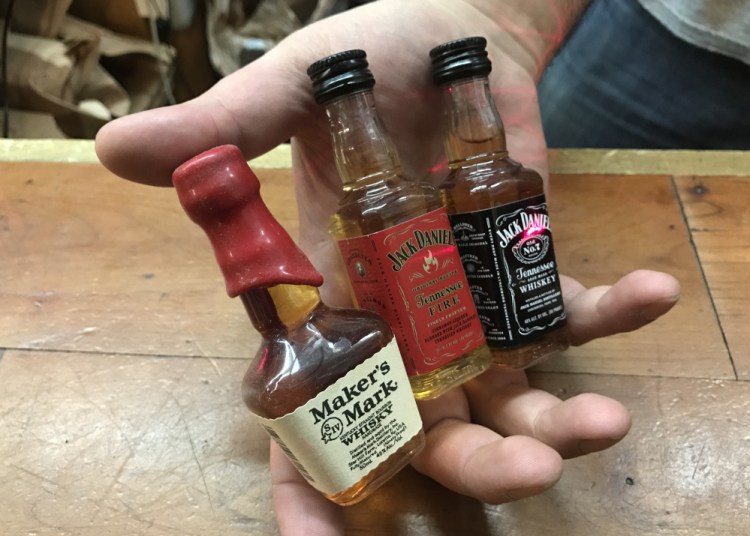The surging popularity of miniature liquor bottles – aka “nips” – is showing up in both the sales reports of Maine’s liquor agency as well as roadside gutters and ditches throughout the state.
Now a group of lawmakers and citizens is arguing that Maine’s bottle deposit law should include a product that all too many users toss back and then toss out the window.
“I’ve started noticing that throughout the city of Biddeford-Saco, and Old Orchard Beach and Portland … they are all over the community,” Bobby Mills, a Biddeford city counselor, said of the nips littering his city. “They are just dumped anywhere. It doesn’t necessarily have to be on the side of the road. It can be in parking lots, on the side of businesses. They can be anywhere.”
Sales of the 50 milliliter bottles often found behind the counter of grocery and convenience stores have increased by as much as 40 percent a year during the past five years, according to the Maine Bureau of Alcoholic Beverages and Lottery Operations. In fiscal year 2016, for instance, the bureau that oversees Maine’s “spirits business” sold an estimated 8.4 million nips bottles to agency liquor stores. That figure is expected to surpass 12 million bottles this fiscal year.
But citizens such as Manchester resident Mark Johnston – who has collected trash during daily walks along his road for the past 25 years – say the diminutive bottles are causing a big problem.
“Suffice to say, I know litter,” Johnston told members of the Legislature’s Environment and Natural Resources Committee. “The miniature liquor bottles have become an increasing share of the litter that I collect to the point that they now exceed, in number, all other types of litter.”
One of several litter bills pending with the Legislature, L.D. 56 would require retailers to also collect a 15-cent bottle deposit on nips just as they currently do for all other wine or liquor bottles larger than 50 milliliters. Consumers could then recoup that money when they return the empty nips bottles at a redemption facility. Additionally, bill supporters said the 15-cent refund would likely encourage others – whether casual passers-by or individuals who supplement their income by collecting returnables – to pick up nips bottles that had been tossed along sidewalks or roads.
If passed by the Legislature, Maine would be on the second state in the nation, after Iowa, to collect a bottle deposit on nips.
Mainers returned 750 million bottles and cans to redemption centers in 2010, accounting for roughly 90 percent of all refundable bottles sold in the state that year.
Rep. Susan Austin, R-Gray, was one of several speakers who brought large bags of nips that they said they collected along the road or in gutters. Austin said she collected $36 in returnable bottles and cans during the year that she picked up litter during her walks.
“If the nips had been (included) … I probably would have been upwards of $50 or $100,” Austin said. “And I wouldn’t have to pick them up at all if the deposit was on it because the real serious, professional pickers would be out there.”
But representatives of the liquor industry, as well as the liquor bureau, warned that such a switch could be costly and difficult to implement.
Liquor bureau Director Gregory Mineo estimated it could cost $1 million a year for Pine State Trading Co. – the private firm that has contracts for both liquor wholesale and bottle redemption services for spirits – to incorporate nips into the bottle bill. That’s because Pine State staff will have to apply the 15-cent deposit label on every bottle unless manufacturers begin incorporating the deposit into their labels.
“As the growth of this product size increases, so will the cost to Pine State and the bureau,” Mineo said.
Likewise, Andrew Hackman, representing the Distilled Spirits Council of the United States, pointed out that Maine is one of only three states nationwide that collect bottle deposits on liquor. Nips sales account for just 3 percent of all spirits sales in the state, Hackman said. Imposing a 15-cent deposit on nips would be a high surcharge for a product that, according to the liquor bureau, typically retails for $0.99 to $1.99 each, Hackman said.
“We’re not making significant profits on these products,” he said. “Consumers are asking for them.”
Additionally, a representative for the Maine Department of Environmental Protection, which administers the bottle bill, said including nips could place an additional burden on redemption centers that will have to figure out how to sort and process the returns.
But Yvette Meunier, who until two weeks ago worked on the bottle bill at the DEP, believes adding nips is both doable and appropriate.
Meunier documented and collected every nip as well as small bottles of “energy shot” drinks and non-returnable milk containers during an 8-mile bike ride along Route 201 from Augusta to Gardiner last April. Meunier said she averaged 9.4 nips per mile – or one bottle every 560 feet – plus more than one energy drink and milk container per mile.
“This was a very painful bike ride,” she said. “I stopped about every 200 feet to pick one up.”
Meunier said that during her time at DEP, she was occasionally forced to turn away liquor companies that tried to register their nips with Maine’s bottle bill program. Some of those companies had gone so far as to include a 15-cent deposit notice on their label, thereby forcing her to reject the application or pull the product from the shelves to avoid confusing Maine retailers or consumers.
“So companies can get confused about the laws,” Meunier said. “There are nips out there that are appropriate, if this passes.”
The committee is expected to hold a work session on the bill next week.
Kevin Miller can be contacted at 791-6312 or at:
Twitter: KevinMillerPPH
Send questions/comments to the editors.



